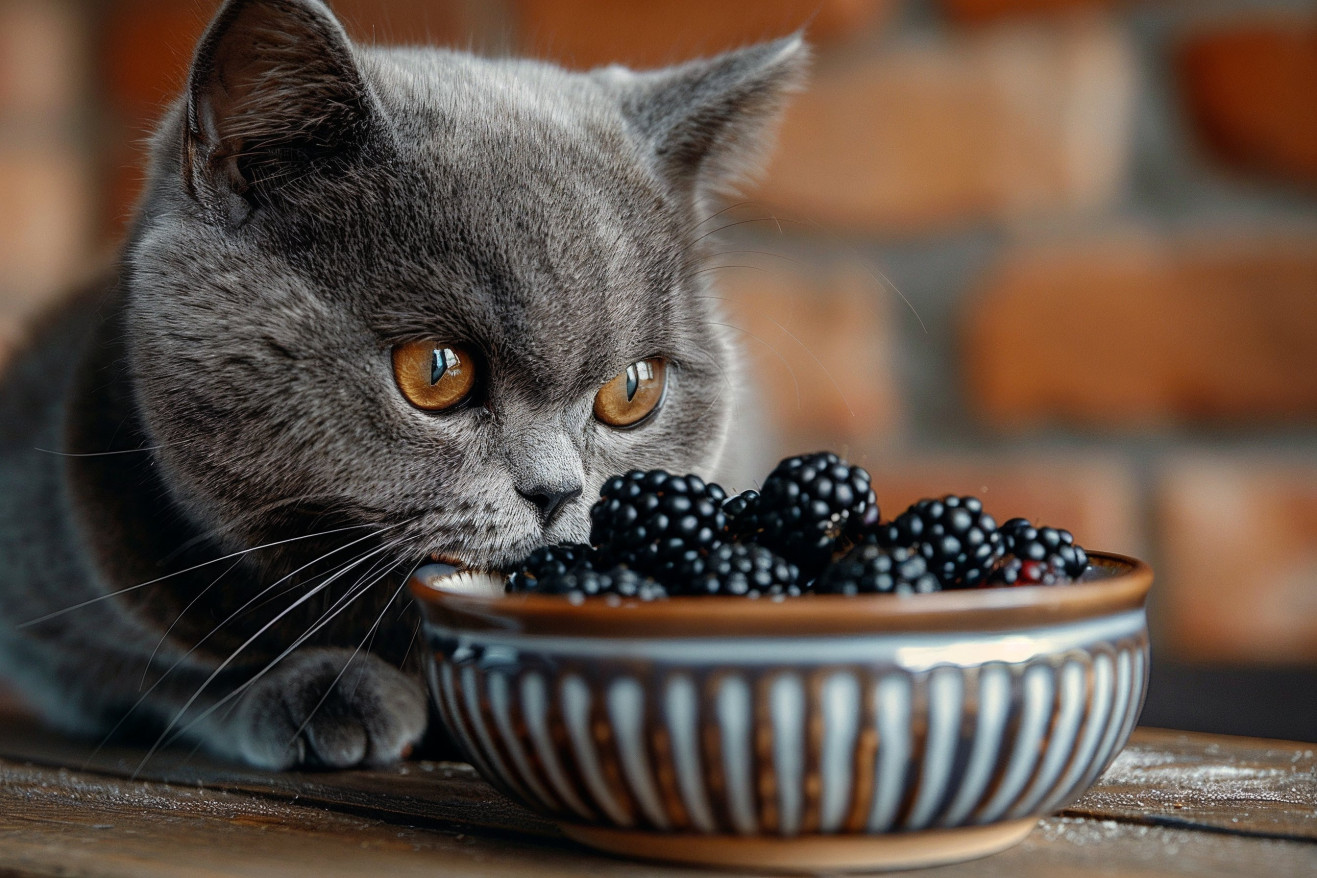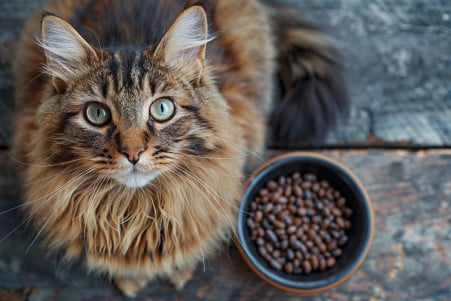Can Cats Eat Blackberries? Nutritional Benefits & Feeding Tips
27 February 2024 • Updated 27 February 2024

You love your cat, but can you let them in on the juicy deliciousness of blackberries? The answer is yes, cats can eat blackberries in moderation. Blackberries are safe for cats, and they can provide some antioxidants and vitamins that can help. However, because cats are obligate carnivores, fruit should be an occasional addition to their diet, and you should always watch for any digestive issues.
This article will cover everything you need to know about feeding your cat blackberries, including the nutritional information, expert advice, and scientific research on the dietary needs of cats.
It will also cover the potential benefits and downsides of giving your cat blackberries and how they compare to the diet cats have evolved to eat. By the end of this article, you will know how to give your cat blackberries as a treat in a way that is safe and healthy.
Can cats eat blackberries?
The Verdict: Nutritional Value of Blackberries for Cats
Blackberries are packed with essential vitamins and minerals, and feeding them to your cat in moderation can be a good way to help ensure that your pet is getting the nutrients they need.
According to BBC Good Food, blackberries are an excellent source of vitamins C and K, both of which are important for a healthy immune system and protecting against disease.
Blackberries also contain vitamin E, an antioxidant that helps maintain healthy cells and overall health. In addition, WebMD reports that blackberries are a good source of dietary fiber, which is important because it can help with digestion and even relieve constipation, a common problem in cats.
That said, it’s also important to note that blackberries contain natural sugars and salicylates, both of which can be problematic for some cats, according to Health.com. While the sugar content is low, it’s not a natural part of a cat’s diet, and it’s best to limit the amount of blackberries you give your cat to avoid any negative effects on their health.
In short, while blackberries are packed with a variety of important nutrients, they should be used to supplement a cat’s diet, not replace it. Cats are obligate carnivores, which means that they need a diet that’s high in animal proteins to be healthy.
Blackberries can be used as an occasional treat to help ensure that your pet is getting the nutrients they need, but it’s important to remember that any changes to a cat’s diet should be made with caution and under the supervision of a veterinarian.
How Cats Digest Blackberries
Cats are obligate carnivores, which means their digestive system is designed to eat a diet that’s primarily made up of animal protein. As a result, cats have a short digestive tract, which is less efficient at breaking down plant-based foods. This means that cats can eat blackberries, but they may not be able to digest them as well as they can animal proteins.
The digestive system of a cat is a complex, highly specialized system that’s adapted to efficiently process meat. According to the Veterinary Teaching Hospital at Washington State University, a cat’s digestive system includes the mouth, teeth, salivary glands, esophagus, stomach, intestines, pancreas, liver, and gall bladder.
However, cats don’t have salivary enzymes to help break down food like humans do. Instead, Catit Magazine explains that digestion begins in the stomach, which is an acidic environment that not only breaks down food but also kills bacteria.
This means that cats digest plant-based foods differently than animal proteins. This is especially true of fruits like blackberries, which are low in protein and fat and high in fiber. In fact, the short length of a cat’s digestive tract is a reflection of their natural diet, which is low in fiber.
As a result, cats may not be able to digest blackberries as well as they can meat, even though blackberries aren’t toxic. This is why the experts at Purina stress that cats need a meat-based diet to get essential nutrients like taurine and arachidonic acid.
As a result, when cats eat blackberries, they may experience digestive upset. According to Purina, signs of digestive upset include vomiting and diarrhea. As a result, cats should only eat blackberries in moderation.
In addition, when cats eat blackberries for the first time, their owners should introduce them to the fruit slowly and watch them closely for signs of digestive upset. This is the best way to make sure that cats can enjoy the benefits of a varied diet while still respecting their digestive limitations.
Blackberry Allergies in Cats
While cats are not known to have allergies to blackberries, it’s important to know and recognize the signs of food allergies and intolerances. According to the Cornell University College of Veterinary Medicine, common food allergens in cats include proteins from beef, fish, and chicken, with plant-based allergens being less common.
Meanwhile, a report from PetMD found that a cat with a food allergy may have symptoms such as itching, skin lesions, or gastrointestinal problems like vomiting and diarrhea.
If your cat experiences any of these symptoms after eating blackberries, it’s important to get them to the vet right away. To be proactive, introduce blackberries into your cat’s diet in small amounts and observe your cat’s reaction over the course of a few days. Dr. Leigh Burkett’s research recommends a slow introduction to avoid the potential for allergies or intolerances that can come from a sudden change in diet.
While food intolerances are more likely to cause digestive issues and allergies involve an immune response, any negative reaction to blackberries should be taken seriously. While there are few, if any, reports of cats having allergies to blackberries, it’s important to stay on the lookout and act quickly if you notice any negative symptoms to keep your cat healthy and happy.
How to Safely Give Blackberries to Your Cat
If you want to give your cat blackberries, there are safe ways to do so. According to Spot Pet Insurance, a good rule of thumb for the initial portion size when introducing blackberries to your cat is a piece the size of a fingernail.
If there are no negative side effects, you can work up to giving your cat 2–3 blackberries at a time, but you should only do so once or twice a week to avoid upsetting your cat’s stomach or throwing off their diet.
When you’re getting the blackberries ready for your cat, it’s important to make sure that you’re keeping cleanliness and safety in mind. You’ll want to make sure that you’re washing the blackberries thoroughly to remove any chemicals, as recommended by Spot Pet Insurance. You’ll also want to make sure that you’re cutting the blackberries into small pieces that are easy for your cat to eat and swallow so that they don’t choke.
It’s also important to keep a close eye on your cat when you’re feeding them blackberries. According to Hepper, you should be on the lookout for signs of an upset stomach or diarrhea, which can be a sign that your cat has had too many blackberries.
If your cat doesn’t like blackberries or has a negative reaction to them, you can try other safe fruits like apples or bananas as a treat, according to Hepper.
Of course, while blackberries can be a healthy addition to your cat’s diet, it’s important to remember that they should never replace the complete and balanced diet that cats need, especially since cats are obligate carnivores. Make sure to keep an eye on your cat’s health and talk to your vet to make sure that you’re making the right dietary choices for your cat.
Final Thoughts: How to Integrate Blackberries into Your Cat’s Diet
In summary, blackberries have a lot of vitamins and minerals, including vitamins A, C, E, K, and antioxidants that are good for cats. However, they should only be given to cats as an occasional treat and not as a regular part of their diet.
Cats are obligate carnivores and have very specific dietary requirements, so they should be eating a diet that is primarily made up of meat. When it comes to treats like blackberries, they should be introduced slowly and given in moderation to prevent issues like diarrhea and allergic reactions, according to Spot Pet Insurance.
Make sure to only give your cat blackberries once or twice a week, cut them into small pieces to prevent choking, and watch for any adverse reactions. Although uncommon, cats can have allergic reactions to blackberries and can also have stomach upset, and cats with diabetes or a history of kidney stones should avoid blackberries because they contain sugar and oxalates, according to the vets at The Vets.
Keep in mind that while it’s not necessary to feed your cat fruit, feeding it to them responsibly can provide them with some variety and a nutritional boost. Always talk to your vet before making any changes to your cat’s diet, especially if they have any health issues, to make sure that you’re taking a well-rounded approach to their nutrition and health.


